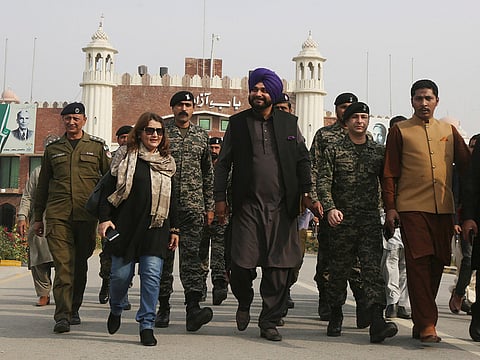Kartarpur: Will Imran Khan heal wounds, bring Pakistan, India close?
On November 28, the Kartarpur corridor for Sikh pilgrims opens

Also In This Package
On November 28, the groundbreaking ceremony for the building of the Kartarpur corridor for hassle-free passage of Sikh pilgrims for the occasion of the 550th birth anniversary in 2019 of Shri Guru Nanak Devji will take place in Pakistan.
From India, on Pakistan’s invitation, in the absence of External Affairs Minister Sushma Swaraj – who having shown a warm response to the invitation tweeted her regrets citing a previous engagement on that day – Minister for Food Processing Industries Harsimrat Kaur Badal and Minister of State for Housing and Urban Affairs Hardeep Singh Puri along with Minister Navjot Singh Sidhu will represent India at the ceremony.
Prime Minister Imran Khan will perform the ground breaking.
Imran Khan’s government like the previous governments of Nawaz Sharif, Yousaf Raza Gillani and the late Benazir Bhutto wishes to have peace with India.
As the Kartarpur corridor connecting the Punjab of Pakistan and India becomes a reality in response to Pakistan’s offer to build a new border crossing and road, it is a reiteration of Khan’s government to be consistent about its conviction to not just have peace but to have a mutually beneficial relationship with India.
As the Kartarpur corridor connecting the Punjab of Pakistan and India becomes a reality in response to Pakistan’s offer to build a new border crossing and road, it is a reiteration of Khan’s government to be consistent about its conviction to not just have peace — but to have a mutually beneficial relationship with India.Mehr Tarar
Against the longstanding backdrop of broken promises, trouble at the LoC, accusations of terrorism and constant finger-pointing, Khan since his post-election victory speech on July 25, 2018 has been vocal about his wish to change the status quo with India.
And despite a tweet or two about “small leaders occupying big positions,” the Kartarpur corridor is representative of Khan government’s narrative that the idea of peace is not conditional, the need to end hostility is not hostage to temporary setbacks, and the imperativeness to keep the dialogue open must not be overlooked even when the situation at the LoC presently seems unchangeable.
Khan is of the firm belief that Pakistan’s equation with India can undergo a tremendous shift if areas of mutual benefit are worked on, trade being the major one.
Two countries that are geographically so close that in certain parts it is hard to tell where Pakistan ends and India starts must put their very troubled past aside, and forge a new roadmap for a relationship that even if not of friendship is based on mutual respect and mutual interests.
Opening a road for religious pilgrims is a great way to connect people of two Punjabs that share many similarities of culture and sensibilities despite the difference in the way to whom they bend their head in prayer.
It is not just a credit to Prime Minister Khan’s political sagacity that his first big overture to India is that of ensuring that the Sikh Indians have an easy passage to pay respects to the founder of their religion, it is a manifestation of his humanity.
Respect for religious sentiments of the Sikh community is Khan’s way of expressing that the geopolitical realities cannot be the wall that is a hindrance in the way of people reaching their most scared religious destination.
Khan, pragmatically aware of the toll a country pays for being directly and indirectly involved in wars, and of unquantifiable human and material price of being a victim of terrorism, is focused on making Pakistan a country that is stable as per all indexes of development, and that would remain an elusive dream if Pakistan does not have peace within and with all its neighbours.
A conflict-free eastern and western border is essential for short and long-term stability and prosperity of Pakistan, and Khan is aware of that.

Prime Minister Khan is that one leader who can make a real difference now. Being consistently anti-war and pro-peace he is the ideal leader to ensure that Pakistan’s foreign policy is devoid of machismo and bombast. Having insisted for years on the need to have dialogue with Taliban to end the war in Afghanistan Khan gained the epithet of Taliban Khan, but to his credit he never changed his stance. Today the US and the EU both recognise the need to have a continued and a sustainable dialogue with Taliban to end the Afghan war. Khan is also a vociferous denouncer of American drone policy, and a relentless supporter of Pakistan not becoming a part of any war against any country.
That Imran Khan as the prime minister can play a historic role in the changing of the dynamics of the chaos that is defined as the Pakistan-India relationship on any given day.
Dialogue defines the agenda for tomorrow, and dialogue is the proposal of Prime Minister Imran Khan and all previous civilian leaders of Pakistan to India to move beyond the history that is dark and dangerous. From the hug of Pakistan’s COAS Qamar Bajwa and Indian state minister Navjot Singh Sidhu to Indian-government-represented Pakistan’s Imran Khan inaugurated November 28 ceremony, the formation of the Kartarpur corridor is not a dim light at the end of the tunnel; it is the positivity that will illuminate the way to delineate a future-based, workable and a brand-new chapter in the unwieldy book called Pakistan-India relationship.
I, ever optimistic, believe Prime Minister Khan will make it happen. Do you?
Mehr Tarar is a writer, columnist and former op-ed editor of Daily Times, Pakistan. The author's twitter handle is @mehrtarar
Sign up for the Daily Briefing
Get the latest news and updates straight to your inbox




